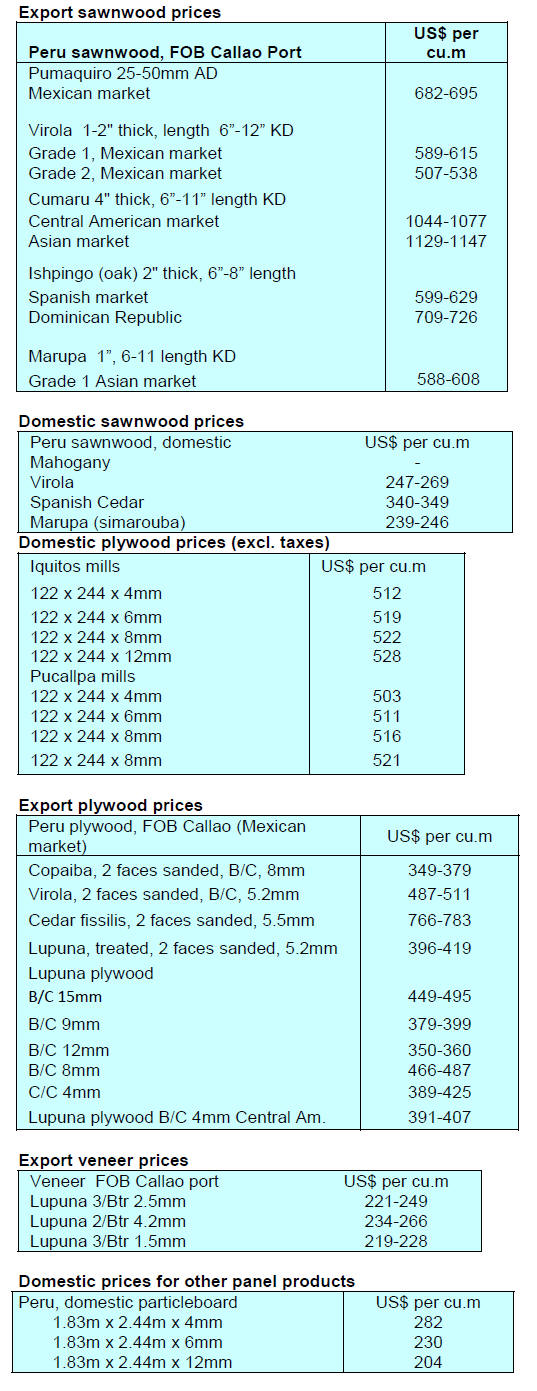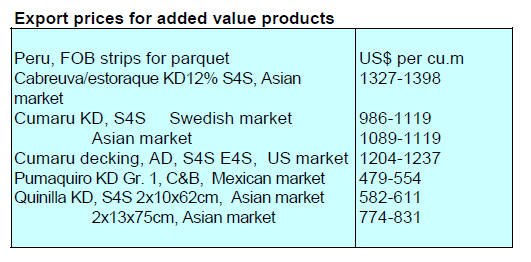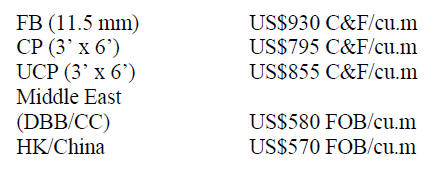
4.
INDONESIA
Promote multi-business forestry
model to optimise
potential
The Indonesian Chamber of Commerce and Industry
(KADIN) launched the Regenerative Forest Business Sub
Hub (RFBSH) initiative to promote multi-business
forestry models in the management of production forest.
Director General of Sustainable Forest Management
Ministry of Environment and Forestry, Agus Justianto,
said that he appreciates this initiative as a step towards the
adoption of multi-business forestry concept.
Agus explained that the multi-business forestry concept
has the landscape as its basis.
This means that businesses in forest areas can not only
utilise wood and non-timber products but can develop and
generate income from environmental and other services.
He added, multi-business forestry will encourage
sustainable forest management and contribute to the
country’s climate change commitments.
Deputy Chairman of KADIN, Silverius Oscar Unggul,
said that RFBSH will create an opportunity for dialogue
between KADIN and KLHK and related parties.
See:
https://www.jpnn.com/news/kadin-gandeng-klhk-wujudkanprogram-multiusaha-kehutanan
Private sector collaboration on developing social
forest plantations
The Indonesian Forest Concessionaires Association
(APHI) signed a memorandum of understanding (MOU)
with Fairventure Social Forestry (FSF) to develop a social
forestry-based plantation forest.
The MoU was signed by APHI Chairman, Indroyono
Soesilo, and FSF Director, Hernica Rasan. The Germany
based FSF will work together to develop social forestry in
the Forest Utilization Permit (PBPH) concessions of APHI
members.
Indroyono said this collaboration is another APHI
membership contribution in support of job creation in the
forestry sector. Indroyono continued,” the second goal of
this collaboration is to create a pilot area that can be used
as a reference in the future on how to manage social
forestry-based plantation forest”. Another objective is
related to the commitment to reduce greenhouse gas
(GHG) emissions.
See:https://forestinsights.id/2022/05/28/aphi-collaborates-withfairventure-social-forestry-to-develop-social-forestry-basedplantation-forest/
President reports of fire management success
The Indonesian President reported achievements in
fighting forest fires at the 7th Global Platform for Disaster
Risk Reduction 2022 saying “Indonesia has succeeded in
reducing damage from forest fires from 2.6 million
hectares (in 2015) to 358,000 hectares in 2021.
He explained the efforts made to reduce the number of
forest fires. Up to 2021 Indonesia had restored 3.4 million
hectares of peatland as well as maintained and revitalised
3.3 million hectares of mangrove forest, around 20% of
the mangrove area.
See:
https://en.tempo.co/read/1595050/jokowi-indonesiamanages-to-reduce-forest-fire-to-only-358000-ha-in-2021
China/Indonesia cooperation in timber sector
The Chinese company Shandong Timber and Wood
Products Association and the management of the Sei
Mangkei Special Economic Zone, North Sumatra, signed a
Memorandum of Understanding (MoU) for the
development of an international industrial area.
The Indonesian Ambassador to China, Djauhari
Oratmangun, said this MoU was the result of intense
negotiations between the Indonesian Embassy in Beijing
and the Shandong Association for almost 3 years.
The Shandong Association, a major business player in the
timber sector in China is believed to be able to make a
significant contribution to improve the quality of wood
production in Indonesia. The chairman of the Shandong
Association, Yang Yuelu, said, "This investment will
strengthen cooperation between the two countries in the
context of the synergy between the Belt and Road
Initiative and the Global Maritime Fulcrum.
See:
https://dunia.rmol.id/read/2022/05/28/535097/dubesdjauhari-optimis-kerja-sama-investasi-industri-kayu-chinaindonesia-bisa-membawa-manfaat-kedua-negara
Regional FSC Standard for smallholders in Indonesia
approved
This standard is for the use by smallholders owning
plantations in Indonesia (Management Units smaller than
20 ha) and applies to rough wood and non-timber forest
products. The standard has been written in easy to
understand language and provides realistic and achievable
indicators relevant to the circumstances of smallholders in
Indonesia.
The Regional Forest Stewardship Standard (RFSS) in
Indonesia is an adaptation of the approved RFSS for Asia
Pacific for Smallholders in Indonesia, India, Thailand and
Vietnam.
See:
https://fsc.org/en/newsfeed/regional-forest-stewardshipstandard-for-smallholders-in-indonesia-approved
Indonesia's first wood pellet plant
Indonesian coal producer, Mitrabara Adiperdana, (MBAP)
will construct a wood pellet plant as part of its plans to
diversify into renewable energy production. The plant is
expected to be operational in the first quarter of 2024.
MBAP plans to export the bulk of the pellets from the
plant to Japan and will be applying for certification that
will qualify the pellets to be used in Japan's feed-in-tariff
scheme.
Indonesia exported 366,286 tonnes of wood pellets in
2021 up from 310,546 tonnes in 2020. Indonesia is Asia-
Pacific's biggest palm kernel shell exporter and the thirdlargest
wood pellet exporter after Vietnam and Malaysia.
See:
https://www.argusmedia.com/en/news/2339079-indonesiasmbap-to-build-its-first-wood-pellet-plant?backToResults=true
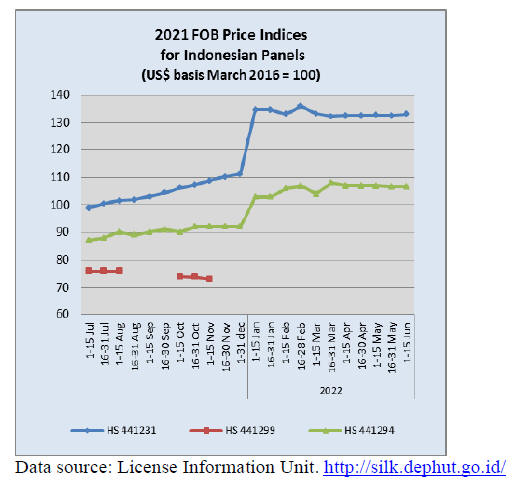
5.
MYANMAR
Reduce reliance on natural
resources - State
Administration Council
At a ceremony to mark the World Environment Day 2022
the Chairman of the State Administration Council and
Prime Minister, Senior General Min Aung Hlaing,
reported that 25.8% of Myanmar’s forests are reserved or
protected areas. He continued saying “Myanmar needs to
emphasise lessening environmental degradation and
adaption to avoid the negative impact of climate change”.
The environmental policy of the government appears
unchanged but critics have voiced concern over an
apparent shift from a conservation-oriented policy to one
of income generation.
see -
https://www.gnlm.com.mm/it-is-necessary-to-reducereliance-of-businesses-on-products-of-underground-and-aboveground-natural-resources-senior-general/#article-title
Harvesting ban could starve millers
The current government put a stop to timber extraction
from April to September 2022 and for the financial year
from October 2022 to September 2023. As a result of
such long logging ban commentators say log supplies may
not meet the demand of the manufacturers but it is not
clear how this will be addressed.
The supply issue has been exacerbated as the Myanma
Timber Enterprise, the sole and only legal supplier of logs,
is facing problems transporting logs from the remote
extraction sites to Yangon where the manufacturers have
their operations due to security concerns.
It is not possible to assess the current level of exports as
the the Ministry of Commerce has not updated statistics on
wood product export since December 2021.
Marketing plantation teak products will be tough
The local newspaper ‘Light of Myanmar’ has reported that
the forestry minister met with manufacturers and discussed
the market situation and the production of doors using the
teak from the plantation forests. For Myanmar, which
utilsed natural teak for decades, the introduction of
products made from the plantation teak will be a
challenging matter not only for the domestic but also
international markets.
Numbers of players in timber sector dwindles
The number of wood product exporters in Myanmar was
over 100 between 2010 and 2015 but has now declined to
around 50. It has been learnt two big factories, one local
and one Indian have recently stopped operations.
The timber industry was one of the top export sectors and
was included in the National Export Strategy, an initiative
aided by the World Bank. Before 2021 the World Bank
had tried to assist development of plantation and
community forestry but this has come to an end.
World Bank Survey and Forecast 2022
The latest World Bank comments on the Myanmar
economy are reproduced below:
“The combined effects of the February 2021 military coup
and of COVID-19 have deepened Myanmar’s economic
and humanitarian crisis. The World Bank’s January 2022
Myanmar Economic Monitor projects that following an
expected 18 percent contraction of the economy in the
year ended September 2021, Myanmar’s economy will
grow 1 percent in the year to September 2022.
While reflecting recent signs of stabilisation in some areas,
the projection remains consistent with a critically weak
economy, around 30 percent smaller than it might have
been in the absence of COVID-19 and the February 2021
coup.
Ongoing economic pressures are having a substantial
effect on vulnerability and food security, particularly for
the poor, whose savings have been drained as a result of
recent shocks. The share of Myanmar’s population living
in poverty is expected to have doubled compared to pre-
COVID-19 levels.
Combined with pressures on agricultural production, rapid
price inflation and reduced access to credit are expected to
further compound food security risks. An estimated one
million jobs are lost, and many other workers experience a
decline in their incomes due to reduced hours or wages.
With a low vaccination rate, inadequate health services
and recent trends of escalating conflict, Myanmar
continues to be highly vulnerable to the ongoing COVID-
19 pandemic.
Over the longer term, recent events have the potential to
jeopardise much of the development progress that has
been made over the past decade.
Significant impacts on investment, human capital
accumulation and the environment for doing business are
likely to impair prospects for economic growth.”
See:
https://www.worldbank.org/en/country/myanmar/overview#:~:text=The%20World%20Bank's%20January%202022,the%20year%20to%20September%202022.
6.
INDIA
Strong growth but rising prices of
concern
Growth in India’s manufacturing sector remains positive,
growing at the fastest pace in more than 11 years in May
on the back of strong international demand. This was at a
time when concerns about the level of inflation dampened
business sentiment. The S&P Global India Manufacturing
Purchasing Managers’ Index (PMI) was at 54.6 in May,
well into postive territory.
However, rising prices dented consumer sentiment which
dropped sharply in May. The main impact was felt in rural
areas because of the export ban on wheat and sugar.
Analysts commented that what is most worrying is that the
recent weakening has moved at a fast pace, much faster
than the pace of the recent rise.
Ties with Africa – VP visits Gabon
The relationship between India and African countries is
strong and driven trade and investments as well as
cultural, historical and political engagements. Between 30
May and 3 June the Indian Vice President, Venkaiah
Naidu, visited Gabon and Senegal. In addition to official
meetings the Vice President met with the business
community in Gabon and addressed Indians living and
working in the country.
See:
https://gabonactu.com/signature-dun-memorandum-entrelanpi-et-la-confederation-de-lindustrie-indienne-en-prospectionau-gabon/
A number of bilateral agreements were discussed to
expand investment, trade and cooperation. Around 800
Indians are living in Gabon, engaged in infrastructure
projects, trading and exports of timber and metal scrap.
Around 50 Indian companies are established in the Gabon
Special Economic Zone (GSEZ).
India is making efforts towards strengthening ties with
Africa. In 2008 India introduced a duty-free tariff
preferential scheme for Least Developed Nations which
benefits 33 African states.
In related news, on the sidelines of the Gabon-India
Business Forum in Libreville the Director General of the
National Agency for the Promotion of Investments (ANPI)
signed, with the Confederation of Indian Industry (CII), a
memorandum of agreement to facilitate investment
between the two countries in priority sectors.
At the signing ceremony Ghislain Moandza Mboma said
the mission of ANPI is to promote investment
opportunities in Gabon, establish partnerships through
creating bridges for dialogue.
New timber research centre to be established
To promote the plywood industry, Haryana Chief
Minister, Manohar Lal Khattar, announced plans to
establish a forest research institute in the State. Khattar
said that the State Government is planning to create an
industrial zone to attract businesses specifically to provide
opportunities for young people.
Prices for recent shipments of teak logs and
sawnwood
Freight rates continue to be high leaving a only small
margin for importers. It has been reported that teak
shipments from Ghana, Brazil and South Sudan have
increased recntly but prices remain unchanged.
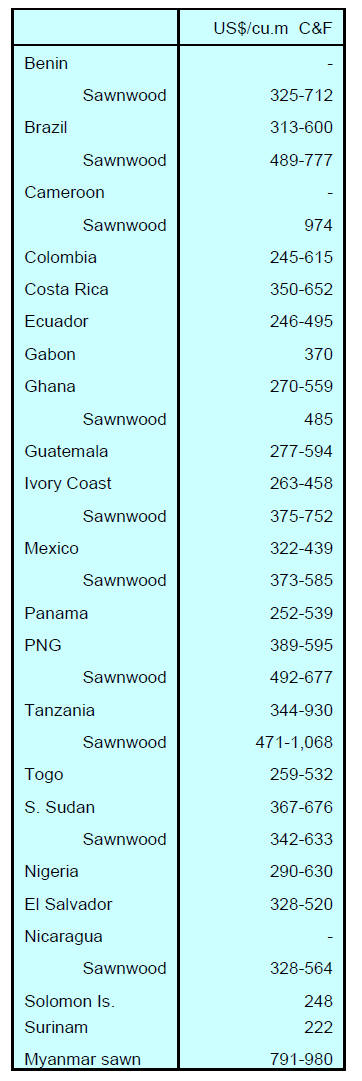
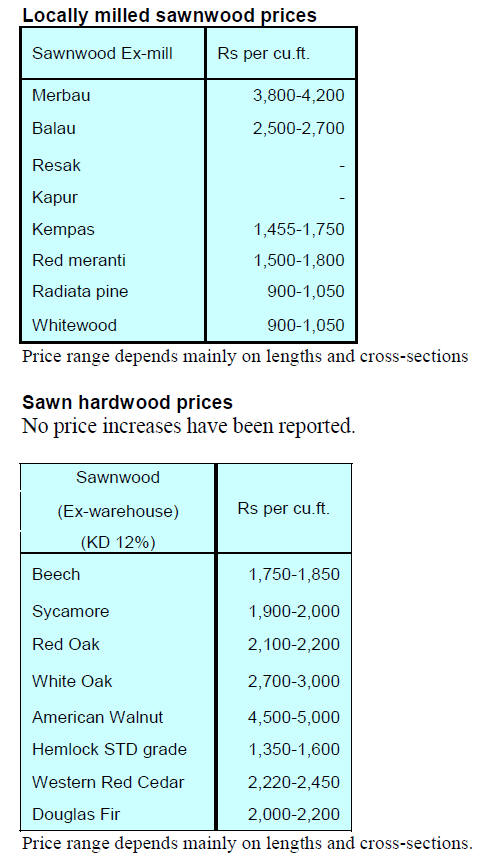
Illicit trade in subsidised urea
Officials have seized and made arrests as a large quantity
of urea was diverted illegally for non-agriculture purposes.
The urea fertilisers were seized in Haryana, Kerala, Uttar
Pradesh, Gujarat, Madhya Pradesh, Telangana, and
Andhra Pradesh. An official said, despite being neemcoated,
the urea meant for agricultural use was diverted to
manufacturers of dyes, plywood glue and cattle feed.
7.
VIETNAM
Trade highlights
Vietnam's W&WP exports to the Chinese market in May
2022 are estimated at US$181 million, up 21.1%
compared to May 2021. In the first 5 months of 2022,
W&WP exports to the Chinese market were estimated at
US$722.1 million, up 5.3% over the same period in 2021.
In April 2022, exports of bedroom furniture reached
US$286.6 million, up 36% compared to April 2021. In the
first 4 months of 2022 exports of bedroom furniture
reached US$870.4 million, up 11% over the same period
in 2021.
Vietnam's poplar wood imports in May 2022 reached
35,500 cu.m, worth US$17.4 million, up 25% in volume
and 28% in value compared to April 2022, however
compared to May 2021 they were down by 3.4% in
volume and 15% in value. In the first five months of 2022
poplar wood imports reached 130,700 cum, worth
US$63.4 million, down 19% in volume and 7% in value
compared to 2021.
W&WP exports in May 2022 are reported at US$1.55
billion, a growth of 8% compared to May 2021. In the first
5 months of 2022 exports of W&WP are estimated at
US$7.15 billion, up 6.9% over the same period in 2021.
With the results achieved over the first 5 months of 2022,
the year-on-year growth is expected to reach 8%.
Despite positive export growth, Vietnam's wood and wood
products exports still face many challenges, including
unpredictable developments of the pandemic, risk of
supply chain disruption due to global trade uncertainties,
escalated freight rates and logistics and scarcity of
imported raw materials.
The opportunities that FTAs bring to businesses by cutting
tariff are immense. However, trade protection with new
technical barriers, including the imposition of antidumping/
anti-subsidy duties, among others may hamper
Vietnam’s export growth.
Exports in first five months
W&WP exports in May 2022 were reported at US$1.55
billion a growth of 8% compared to May 2021. In the first
five months of 2022 exports of W&WP were estimated at
US$7.15 billion, up 7% over the same period in 2021.
With the results achieved over the first 5 months of 2022
the year-on-year growth in the first half of 2022 is
expected to reach 8%.
Despite positive growth exporters face many challenges
such as unpredictable developments of the Covid-19
pandemic, risk of supply chain disruption due to global
trade uncertainties, escalated freight rates and logistics,
and scarcity of imported raw materials and fuel.
The opportunities that FTAs bring to businesses through
reduced tariff are immense. However, trade protection
through new technical barriers along with antidumping/
anti-subsidy duties may hamper export growth.
Over the last 5 months of 2022 exports of bedroom
furniture, flooring, woodchips, kitchen cabinets, wooden
doors, handicraft furniture, mirror frames all grew well. In
particular the exports of kitchen cabinets topped the
growth rate reaching US$447.9 million, up 54% over the
same period in 2021.
After cabinets was wood flooring where exports generated
US$700 million, up 27%; wooden doors brought in about
US$16.7 million, up 28%. This growth momentum is
expected to continue in the next months of the year.
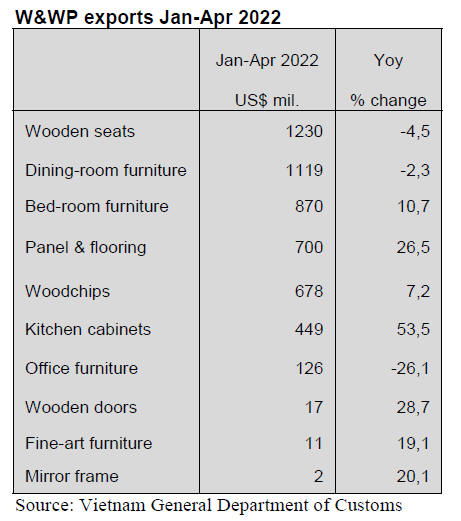
Export markets
In the first 4 months of 2022, despite the pandemic
situation and the Russian invasion of Ukraine W&WP
export markets grew quite positively. In particular the US
continues to be the largest furniture market for Vietnam
with exports reaching US$3.34 billion in the first four
months of the year, up 6.6% compared to the same period
in 2021.
The second market was Japan at US$545.2 million, up
15%; China US$539.9 million, up 2%; South Korea
US$356.6 million, up 21%; and the EU US$263.5 million,
up 5%.
The W&WP exports to Japan, Australia and Malaysia
increased sharply in the first 4 months of 2022. These
countries are members of the Comprehensive and
Progressive Trans-Pacific Partnership (CPTPP). The new
FTAs, thus, has supported Vietnam's wood processing
industry to boost exports to many markets by increasing its
competitiveness over exporters from non-FTA countries.
See:
http://www.asemconnectvietnam.gov.vn/default.aspx?ZID1=8&ID1=2&ID8=120040
Directive to eliminate deforestation and encroachment
A recent government directive identifies serious violations
of regulations on forest protection in some provinces such
as large-scale illegal deforestation.
To effectively prevent deforestation and implement
international commitments made at the 26th United
Nations Climate Change Conference (COP26) the Prime
Minister instructed relevant ministries, sectors and local
authorities to tighten the management of forests
particularly limiting the change of purpose of forest land.
He added, investigations into illegal forest destruction
cases should be speeded up and violators punished.
Provinces and cities must direct forest rangers to examine
and evaluate the entire natural forest area under their
management so as to promptly detect, prevent and deal
with acts of encroachment on forest land according to the
directive.
See:
https://en.nhandan.vn/scitech/item/11561202-pm-requiresaction-be-taken-against-illegal-forest-destructionencroachment.html
8. BRAZIL
Centres to combat
deforestation and fires in the
Amazon
In May the National Council of the Legal Amazon
(Conselho Nacional da Amazonia Legal - CNAL) that
coordinates and integrates the activities of ministries and
Federal agencies related to the Amazon Region hosted a
meeting to discuss the Brazilian Federal Government's
actions for the preservation and development of the
Amazon. The Ministry of Science, Technology and
Innovations (MCTI) attended the meeting and highlighted
the main initiatives in the Legal Amazon.
As a result it was decided to establish 6 centres to combat
illegal deforestation and forest fires in the region. These
bases are part of the Operation Guardians of the Amazon
Biome, a joint action with the Ministry of Justice and the
Ministry of the Environment. The eventual aim is to have
10 bases operating throughout the Amazon Region.
During the meeting the importance of combining
preservation and conservation along with the development
of the Legal Amazon was highlighted. Mention was made
of the investments in research and incentives for the
sustainable utilisation of the Amazon biodiversity, the
“Regenera Brazil” programme for the recovery of
degraded areas and international partnerships in projects
such as the ATTO Tower (Amazon Tall Tower
Observatory).
The CNAL meeting also dealt with the Strategic Plan of
the National Council for the Legal Amazon 2020-2030
and the “Our Amazon Plan”. These plans align and
integrate the actions planned by the Federal government
for the region.
CAD Madeira programme strengthened
The CAD Madeira programme has been upgraded in order
to ensure the registration of companies that sell timber and
other forest products coming from natural forests.
The programme is one of the modules of the Legal Wood
initiative which seeks to curb the illegal trade of timber
coming from the natural forest to the state of São Paulo
(main financial centre of the country).
Through the registration process the programme also has
an inspection component with the support from the
Environmental Police which is engaged in the monitoring
of logging, timber processing, transport,
commercialisation and storage of forest products.
Among the measures updated are the current rules, supply
chain analysis for the issuance of the programme's seal and
state certification for companies and traders that acquire
timber from suppliers registered in the programme.
The objective is to encourage the purchase of materials
from suppliers registered with the state to ensure
traceability and verification of the origin of timber based
on management plans registered with SINAFLOR
(National System of Control of the Origin of Forest
Products).
See:
https://www.infraestruturameioambiente.sp.gov.br/2022/06/governo-de-sao-paulo-amplia-programa-contra-madeira-ilegal/
“Casa Brazil” event in New York
The United States, one of the largest importers of
Brazilian furniture products, welcomed 65 Brazilian
companies to the “Casa Brazil” event in New York held at
the end of May. The event was promoted by the Brazilian
Trade and Investment Promotion Agency (Apex Brazil)
and was held in parallel to the International Contemporary
Furniture Fair (ICFF), the largest fair for contemporary
furniture design in North America.
The US is Brazil's biggest trading partner for furniture
accounting for 23% of Brazilian furniture exports which is
40% of the national production. According to Apex, Brazil
saw a 51% increase in furniture exports between 2020 and
2021. For 2022, according to the projections, the increase
should follow the trend and a 42% increase is estimated.
See:
https://pix11.com/news/local-news/manhattan/nyc-exhibitcasa-brasiloffers-an-immersive-brazilian-experience/
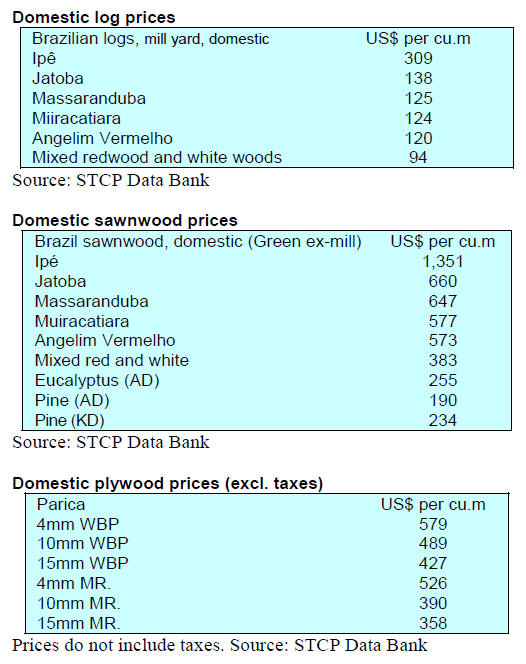
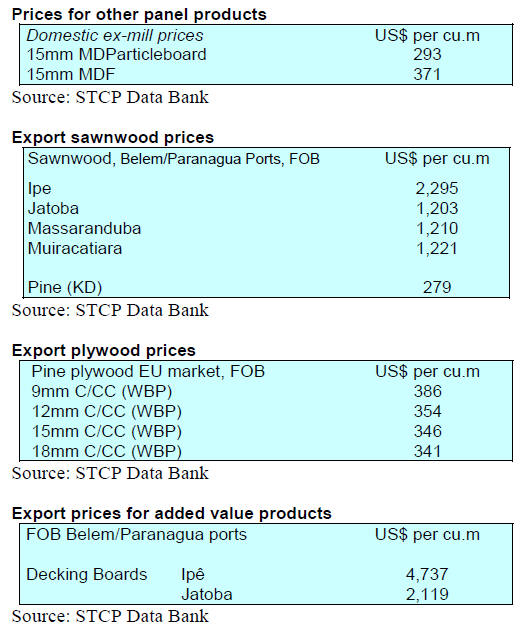
9. PERU
ADEX recommends tax rebate for SME
sub-contractors
According to an Association of Exporters (ADEX) press
statement Peru has 21 Free Trade Agreements with 54
countries which opens the possibility of accessing a large
international market.
Non-traditional exports (such as wood products) are
constantly growing in part due to the FTAs and this is
reflected in the fact that in the last two decades Peruvian
shipments abroad multiplied by seven times.
In addition, Peru has three million jobs associated with
export activity which contributes around 29% of
GDP. That is why ADEX is urging the government to
introduce measures so as not to lose what has been
achieved in the last 20 years.
Regarding this, the president of the ADEX, Julio Pérez
Alván, recalled that "among the short-term measures we
propose to restoring the drawback to the SMEs that are
part of the export chain."
The drawback is the Customs system that allows the return
of a percentage of the FOB value (balance in favor of the
beneficiary) thanks to the total or partial restitution of the
customs duties that have been levied on the import of
inputs that are incorporated or consumed in the production
of exported goods. From 2019 to date, the drawback rate is
3%.
"Currently only companies that sell in foreign markets
have this tax regime, however, these companies are
supported by suppliers and they must have this benefit
because their production is ultimately directed abroad "
Pérez added.
See:
https://vigilante.pe/2022/06/13/peru-adex-exportaciones-noperdamos-lo-avanzado/
High cost international maritime transport causing
cost overruns
In other news from ADEX, a letter has been sent to the
Minister of Foreign Affairs (RR.EE.), César Landa
Arroyo, by the Association of Exporters (ADEX)
suggesting seeking action by the World Trade
Organization (WTO) and UNCTAD in resolving the
serious problem of international maritime transport that
causes cost overruns, makes Peruvian foreign trade less
competitive and makes it difficult to reactivate the
economy.
The lack of space in the warehouses triggered the costs of
the containers, even paying a high freight does not
guarantee the shipment of the merchandise or its arrival at
the final destination in the established times.
The union argued that, given this unprecedented problem,
it is important to escalate it to the WTO and UNCTAD of
the United Nations, in order to have measures to improve
the conditions and flow of foreign trade.
See:https://www.adexperu.org.pe/notadeprensa/adex-pideescalar-a-la-omc-y-unctad-problema-del-transporteinternacional/
Chancay Port project – work to begin
The tender for the Chancay Port project, a multipurpose
terminal, was won by China Harbour Engineering
Company, a subsidiary of China Communications
Construction Company.
The complex will be north of Lima and when complete it
will be able to handle 1.5 million twenty-foot-equivalent
containers and 6 million tonnes of general cargo a year.
The client for the project is Peru’s Ministry of Transport
and Communications.
The port is seen as China’s gateway to Latin America as it
will improve links between Asia and Peru, Bolivia,
Uruguay, northern Chile, Colombia and Ecuador.
See:
https://www.globalconstructionreview.com/contractorchosen-to-build-perus-3bn-chancay-port/
